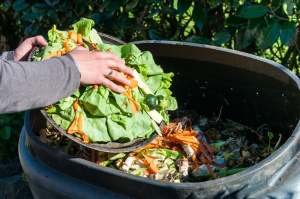When you compost you not only create at home the best nutrients to feed your garden you also participate in reducing the waste sent to our landfills.
How do you set up your at home composting?
- Find a place
- Add some stuff
- Turn
1. Find a place for your Compost: The location doesn’t have to be complicated for expensive. It needs to be a container of some sort so the contents can do their chemical work. Some folks use large plastic trash cans, large wooden boxes, and store bought compost containers. Others just build in a deep hole in the ground.
2. Add some stuff from your kitchen or other parts of your landscape. The key combination is green and brown and a little moisture to keep the active bacteria hydrated. Green waste is kitchen waste and grass clippings. Brown waste is small pieces of newspaper, wood chips and dried leaves.
3. Turn your compost pile with a pitchfork, ideally, or a shovel. Air is important to keep up the bacterial activity up in your compost. Remember that the addition of soil from your garden and dried leaves and twigs from you yard are excellent additives to keep your heap aerated.
Some helpful hints to jump start your compost.
Size Matters: The bigger the pile the better. The more material you compost the more lucrative the outcome. The size of the pieces, however, need to be small. Larger pieces take longer to degrade.
Wet and Wild: Your compost is a living organism. It needs moisture as much as any living creature. Especially when weather get warmer, remember that your compost needs water.
Mix and Match: The more variety you feed your compost the more it will thrive. Imagine if you had to eat the exact same meal everyday… Boring! The diversity also will help your plants’ resistance to disease and pests.
KISS: Keep It Simple Stupid (no offense) Composting is simple science. Keep is organic, no proteins. If it keep on the shelf for more than a few days, it probably has preservatives and should not be included.
Don’t be afraid to ask for help: The do sell “Compost Activators” that make start up simple. Get help if you’re new, the goal is to make great fertilizer, not to struggle and be unsuccessful.


